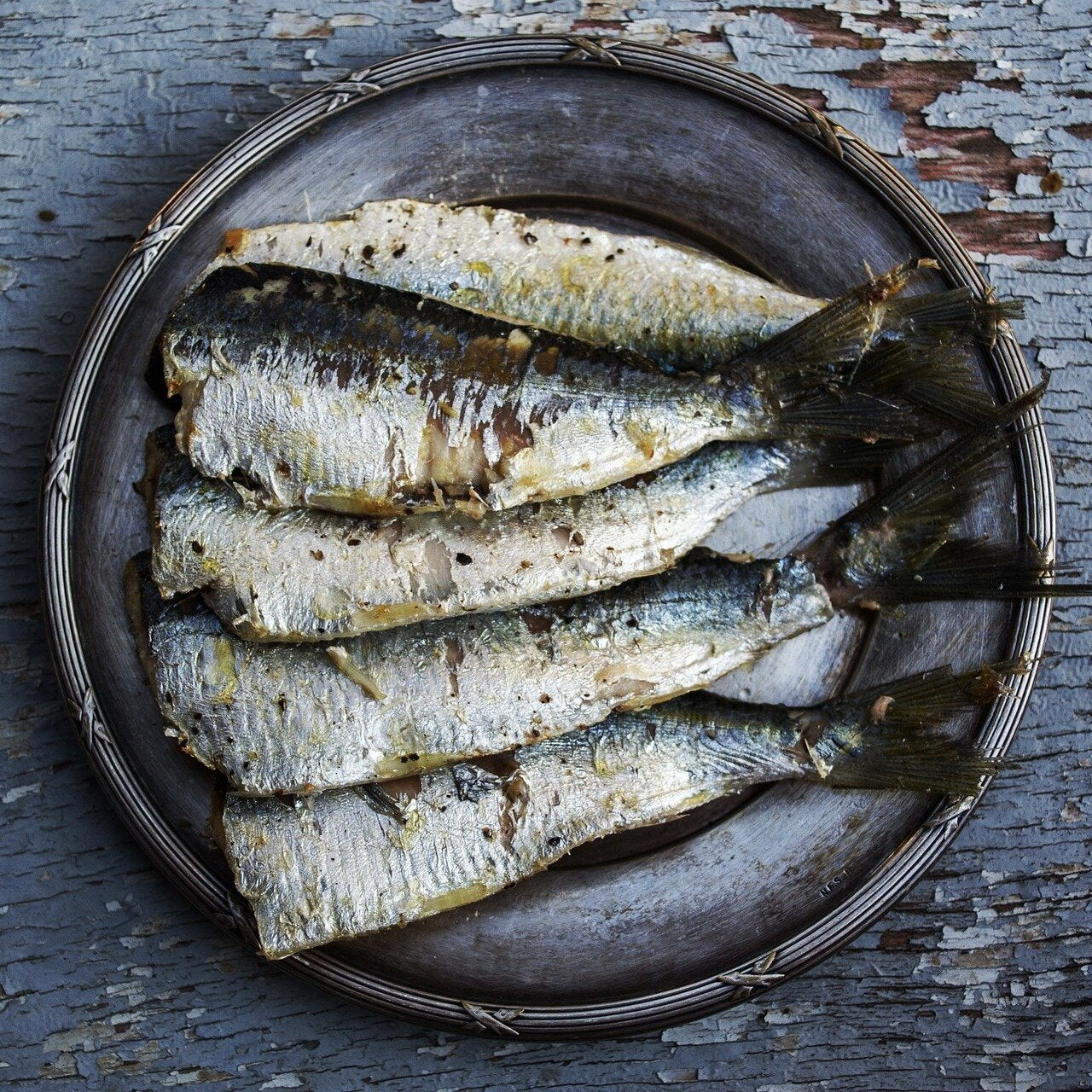The 20th century has seen the rise of the fabled ‘superfood.’ Green tea, blueberries, ginger, and avocado are just a few examples of foods that claim to have a wide range of benefits ranging from better memory to a healthier liver. While none of these foods accomplishes every dietary goal, many of them provide legitimate health benefits due to a higher amount of a specific nutrient. Today, let’s examine one of these examples: are sardines good for your skin?
Omegas
Omegas are a class of nutrients that has garnered a lot of attention in the last decade. Are the omegas in sardines good for your skin?

Back to the Basics
Before we discuss the potential benefits of omegas, we have to first go back to chemistry class. ‘Omegas’ (used in the context of fats) refer to a subset of fatty acids that are ‘unsaturated.’ These are generally regarded as the healthier type of fatty acid. The distinction between saturated and unsaturated is purely chemical, modern nutrition has simply discovered that some types of fats are healthier than others.
Many people who have dived into the world of nutrition may be familiar with some specific types of omegas like omega-3 and omega-6. Just like the distinction between unsaturated and saturated fats, the difference between omega-3 and omega-6 is once again a chemical distinction. That being said, each type of fat has its own benefits, but we’ll focus on the type most commonly found in sardines: omega-3.
Omega-3 in Sardines
Omega-3s are a category of fatty acids and there are three main ones: alpha-linolenic acid (ALA), eicosapentaenoic acid (EPA), and docosahexaenoic acid (DHA). The last two - EPA and DHA - are the main types of fatty acids found in cold-water fatty fish like sardines. They have been shown to be an essential part of a healthy diet: they are an important part of cell membranes, they have regulatory functions in the heart, and function in the endocrine system as well.
So then, how does all of this pertain to skin health? A 2011 paper authored by the Salford Royal NHS Foundation Hospital in Manchester, England looked at this very topic. Previous evidence suggests that guinea pigs fed a diet enriched in ALA showed higher portions of EPA and DHA (which can be derived from ALA) in their skin and fur. Furthermore, hairless mice fed a diet high in ALA showed less damage when exposed to UV radiation (sunlight) than mice fed a regular diet.
Tying all of this together, a 2003 study found that a “3‐month course of 4g EPA daily resulted in skin EPA levels increasing 8‐fold.” All of this data suggests that a diet rich in omega-3s, specifically the kind found in sardines, can lead to an accumulation of EPA in the skin which may help provide a natural barrier to sunlight.
Verdict
Maybe omegas in sardines will help curb the sunburn, but they're no replacement for reapplying sunscreen every 90 minutes if you’re looking to protect your skin.

CoQ10
CoQ-10, more formally known as coenzyme Q10, has been a hot topic in popular nutrition and health. Humans produce it naturally, but it can be taken as a supplement and is also found in meat, whole grains, and fish (like sardines). Its purported benefits range from headache reduction to exercise performance, but what does the evidence have to say about its effects on skin health?
Survey Says...
A 2015 study found that “topical Q10 treatment is beneficial with regard to effective Q10 replenishment, augmentation of cellular energy metabolism, and antioxidant effects.” In short, applying Q10 to the skin has shown to provide a range of benefits. Separately, a 1999 study found that topical application of Q10 helped to visibly reduce the appearance of wrinkles by reducing wrinkle depth.
All of the above studies looked at topical application of the coenzyme directly onto the skin, but what about the effects of supplementing Q10 in pill form? The results look similar. A 2017 study found that “the administration of a dietary supplement containing CoQ10 over a 12-week period showed several anti-aging effects as it reduced wrinkles, improved skin smoothness, and microrelief as well as skin firmness.”
Good for Skin?
So then is the scientific consensus set? Not so fast. While most data suggests that Q10 is, in fact, healthy for skin whether applied topically or consumed as a supplement, there doesn’t seem to be any data suggesting that eating food rich in Q10 will have the same effects. In fact, according to the Mayo Clinic, “The amount of CoQ10 found in these dietary sources, however, isn't enough to significantly increase CoQ10 levels in your body.”

Verdict
CoQ10 likely provides a variety of skin benefits, but these may not be attained by consuming foods that are rich in CoQ10.
Selenium
Like CoQ10, selenium is often hailed as a miracle ‘micronutrient.’ The reported effects of selenium range from cell protection to boosting immune health. In regards to skin health, selenium has long been used, in the compound sodium selenite, as an effective dandruff treatment. Deficiencies in selenium have even been linked to higher rates of cancers, specifically skin cancer. Furthermore, diets rich in selenium have been shown to be effective in protecting skin from UV radiation and successful in the treatment of psoriasis.
Individuals with selenium deficiencies can be prescribed supplements to counteract the possible negative effects. The normal daily dosage of selenium is 40-70 micrograms per day for an adult. Coincidentally, the average amount of selenium in a 3 ounce serving of sardines is typically 45 micrograms. This means that the average adult can satisfy their daily dosage of selenium with 3-5 ounces of sardines.

Verdict
Selenium can absolutely improve skin health in a variety of ways, especially if an individual is deficient in selenium.
The Final Word
So where does all of this information leave us? The current scientific consensus shows that eating sardines can have a variety of positive effects on skin health, but only in specific circumstances. When combined with other healthy lifestyle choices, sardines can serve as a useful tool to improve overall skin health and wellness.
That being said, there is no need to boil sardines' benefits down to just skin health. Sardines are generally considered to be very healthy and may provide a multitude of other benefits aside from just glowing skin.
All good things in moderation, as the saying goes. They are delicious and can be quite addictive, so be sure to incorporate sardines into a healthy and varied diet.
Written by Patrick O'Hare on November 14, 2019.


